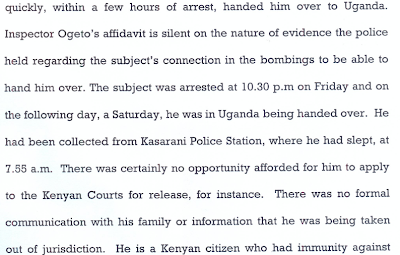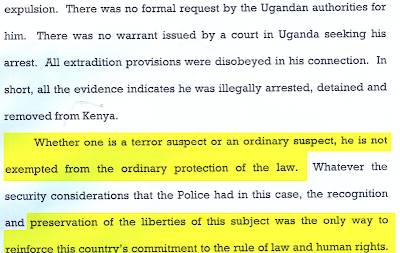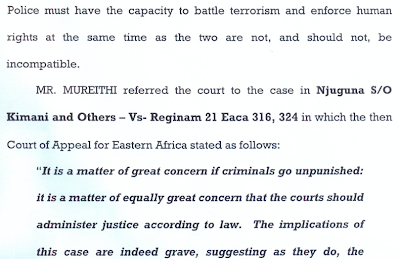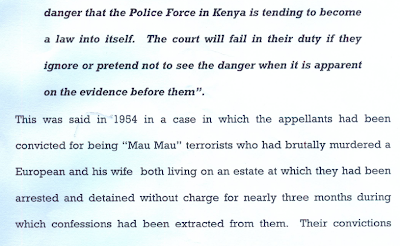(updated below)
During the Bush-era torture debates, I was never able to get past my initial incredulity that we were even having a "debate" over whether the President has the authority to torture people. Andrew Sullivan has responded to some of the questions I posed about his defense of Obama's assassination program, and I realize now that throughout this whole assassination debate, specific legal and factual issues aside, my overarching reaction is quite similar: I actually can't believe that there is even a "debate" over whether an American President -- without a shred of due process or oversight -- has the power to compile hit lists of American citizens whom he orders the CIA to kill far away from any battlefield. The notion that the President has such an unconstrained, unchecked power is such a blatant distortion of everything our political system is supposed to be -- such a pure embodiment of the very definition of tyrannical power -- that, no matter how many times I see it, it's still hard for me to believe there are people willing to expressly defend it.
Moreover, it's almost impossible to ignore how similar are the rhetoric and rationale between (a) Bush supporters who justified presidential torture and (b) Obama supporters who now justify presidential due-process-free assassinations. Please read Daniel Larison's argument about that, responding to Sullivan's post. He's exactly right.
The central rhetorical premise of Bush defenders was that if they just scream "Terrorist!!' and "we're at war!!!!" enough times, and loudly enough, then it would make basic precepts of due process, Constitutional safeguards and the rule of law disappear. If they demonized their targets enough (this is a really bad Terrorist who wants to kill Americans, with nukes if he can!!) -- or manipulatively invoked 9/11 enough times (note Andrew's prominent display of a smoldering WTC photo strategically placed at the top of his argument) -- then it would mean that anything goes, that no compliance with law is or should be required to do anything to them (a claim that always led to the unanswerable question: if it's really so obvious that this is a really bad Terrorist, then why not prove it in court?).
And if you just toss enough insult-strawmen at those who insist upon basic rights even when "we're at war!!," then you can marginalize them to the point of invisibility (I wasn't around in 2003 and thus never got to be accused by Andrew of being a Far-Leftist-pacifist-unwilling-to-fight-the-menace-of-Islamic-Evil, so I guess it's nice that I'm making up for that now. I always thought a "pacifist" was one who opposes the use of force under all circumstances, even self-defense [a view to which I do not subscribe]; I never knew that one becomes a "pacifist" by believing that the President lacks the power to order his own citizens assassinated far from any battlefield without due process). Just read Andrew's post to see how reliant he is on these same tactics to justify Obama's program: quite ironic, given how often he has had these same tactics used against him during his steadfast, eloquent opposition to torture.
In any event, I was going to address a few of Andrew's specific claims, because some of them are factually inaccurate (I don't believe that's intentional, but merely the by-product of the fact that Andrew doesn't write about the legal issues raised here very often). And I still will do that below, but before I do: as I was writing this, I received an email from a Kenyan lawyer, David Majanja, that so perfectly illustrates how far America has fallen on these issues of basic liberty as compared to much of the rest of the world, and what authoritarian extremists many Americans have become on these questions, that I want to feature it first.
As Majanja noted in his email to me, Kenya faces a massive threat from terrorism. Radicals bombed the U.S. embassy in Nairobi in 1998 and attacked an Israeli-owned tourist resort and Israeli airliner in Mombasa in 2002, and that country has repeatedly been under Terrorist threats for the last decade. Nonetheless, consider this court decision that was just issued in Nairobi on Thursday. A Kenyan Muslim, Mohamed Sulemein, was detained in August -- without any charges or due process -- by Kenyan anti-terrorism agents (the ATPU), accused of having participated in the horrific June World Cup bombings in Kampala, Uganda, which killed 74 innocent people. He had his passport seized and was told he would be sent to Uganda without any opportunity to contest the accusations against him. His wife filed a habeas corpus petition in a Kenyan court, demanding that "he be treated in accordance with the laws and Constitution of Kenya," which, among other things, guarantees the right to be charged with a crime within 24 hours of arrest and not to be shipped outside the country without a hearing.
The Kenyan Court agreed, and ruled that the due-process-free extradition of this accused Terrorist to Uganda was illegal and unconstitutional. Just read what the court said to see what's so profoundly absent from American political thought; this, to me, is the crux of all of these debates, including the one over presidential assassinations:
The person whose rights were denied there is accused of Terrorist acts every bit as reprehensible and dangerous as the accusations aimed at Anwar Awlaki. His rights were denied to a far less extreme degree than what is being done to Awlaki (rendition to Uganda for trial v. being targeted for due-process-free assassination). Kenya faces a Terrorism threat at least equal to what the U.S. faces, and several times has suffered atrocious attacks on its soil. But they are nonetheless able to recognize that citizens "are not exempted from the ordinary protections of law" by virtue of being a Terrorism suspect, and that "the preservation of liberties [even for Terrorist suspects] is the only way to reinforce this country's commitment to the rule of law and human rights." If only that recognition were equally widespread in the U.S., which still holds itself out as "the leader of the free world."
* * * * *
As for Andrew's specific claims: I realize that it's not possible for him to address every point I made and that he made a good faith effort to answer the questions I asked, but I was still disappointed to see him ignore these questions, because these are the same ones I could never get Bush supporters to answer either: (1) would you also be comfortable with having a GOP President -- such as Sarah Palin -- vested with the unchecked power to order American citizens killed far from any battlefield, with no due process and no obligation to prove the accusations?; (2) Andrew says that the President does not have the right to kill American citizens on U.S. soil, but what rationale can justify that limitation once you endorse the view that the President can order citizens killed anywhere they are found via the mere accusation of Terrorism?; (3) shouldn't the long and disturbing record of serious error and/or abuse on the part of both the Bush and Obama administrations -- whereby numerous individuals, a majority, have been falsely accused of Terrorism -- lead a rational person to refuse to vest faith in the President's ability to decide who is a Terrorist without due process or oversight?; and (4) how could Bush's oversight-free detention or eavesdropping of citizens be so dangerous, whereas Obama's oversight-free killing of them isn't?
Then there are several factually inaccurate assertions. Andrew claims that Obama has "expanded judicial review of this kind of military action," which is the only reason Awlaki's case is in court. The claim that these assertions of power are being reviewed by courts due to Obama's beneficence is absolutely false; they're in court because Obama -- like Bush -- has been sued for acting illegally and unconstitutionally, and Obama -- like Bush -- has asserted that no courts can review his conduct due to secrecy and standing (see this article from the Obama-friendly TPM site -- headlined: "Expert consensus: Obama mimics Bush on state secrets" -- to see how identical the conduct is). Obama's argument is the exact opposite of what Andrew claims: it's that courts have no right and no power to review his decisions about which citizens are assassinated.
Then Andrew cites Ex parte Quirin [1942] to claim that "it is utterly uncontroversial that the military can kill a US citizen abroad if he is waging a treasonous war against the United States," but even that case -- long considered quite radical and a favorite of the Yoo/Addington camp -- came only after the defendants were charged in a military commission of being saboteurs, and the Supreme Court merely held that military commissions constitute sufficient due process for the offenses with which they were charged. Here's what the Court actually said (emphasis added):
The President, as President and Commander in Chief of the Army and Navy, by Order of July 2, 1942, appointed a Military Commission and directed it to try petitioners for offenses against the law of war and the Articles of War . . . On July 3, 1942, the Judge Advocate General's Department of the Army prepared and lodged with the Commission the following charges against petitioners, supported by specifications: . . . The Commission met on July 8, 1942, and proceeded with the trial, which continued in progress while the causes were pending in this Court . . .As announced in our per curiam opinion we have resolved those questions by our conclusion that the Commission has jurisdiction to try the charge preferred against petitioners. . . .
We are concerned only with the question whether it is within the constitutional power of the national government to place petitioners upon trial before a military commission for the offenses with which they are charged. . . . Lawful combatants are subject to capture and detention as prisoners of war by opposing military forces. Unlawful combatants are likewise subject to capture and detention, but in addition they are subject to trial and punishment by military tribunals for acts which render their belligerency unlawful. . . . We hold only that those particular acts constitute an offense against the law of war which the Constitution authorizes to be tried by military commission.
Aside from the fact that these defendants were caught in the act of engaging in hostilities -- not sleeping or driving in a car with their parents, as Awlaki might be doing when he's killed -- this case doesn't remotely justify assassinating citizens without any due process, and I really hope Andrew would retract the suggestion that it does. The whole point of Ex parte Quirin -- as anyone can see -- is that these defendants were given due process: a military tribunal which the court found constitutionally adequate under the circumstances. That's the opposite of Obama's due-process-free assassinations.
Then Andrew says this:
I agree that the Obama administration's decision to shut down inspection of the evidence behind the decision to regard Awlaki as someone waging an active war against the US under "state secrets" is a step way too far. I think the president has a duty to explain in court why he believes this person must be treated as an active enemy at war with the US, and therefore treated as all such enemies in wartime as someone to be killed.
But this is the crux of the whole dispute. Once one concedes this, what disagreement is left with critics of Obama's conduct? What Andrew says Obama has a "duty" to do -- "explain in court why he believes this person must be treated as an active enemy at war with the US" -- is precisely that which Obama is steadfastly refusing to do. Rather than indict or charge Awlaki, or even respond to his lawsuit with evidence of his guilt, he's simply asserting the right to kill him without any oversight. Indeed, before Awlaki's father filed suit, that's exactly what Obama has been trying to do: kill this American citizen without any due process whatsoever (along those lines, Andrew's announcement that he's "sick of the left treating Obama as if he has done nothing to change the dictatorial, illegal and indecent policies of his predecessor" is very odd, given that Andrew himself -- in a post from several weeks ago which he entitled "The Untamed Prince" -- called for the prosecution of Barack Obama as a war criminal, and wrote: "Obama as executive quickly co-opted the kind of blanket secrecy and protection of the national security apparatus from the rule of law that plagued us in the Bush-Cheney administration"; those are Andrew's words, not the words of "the left").
But the most telling part of his response is where Andrew replies to my question about how he knows that Awlaki is actually an "Al Qaeda Terrorist" who deserves to die:
There is much public information about Awlaki, and I urge readers to go to Wiki and examine the public record and sources in detail to make their own minds up. . . . But seriously, is Glenn honestly saying that a man who has committed treason, has had multiple direct contacts with al Qaeda, including the 9/11 mass-murderers, has been directly connected with inciting American citizens to kill others in terror attacks is not, self-evidently, an al Qaeda terrorist who poses a direct and imminent threat to innocent human beings, motivated by a poisonous religious ideology that was responsible for the murder of 3,000 people on 9/11?
This is what we're reduced to in America: trial by Wikipedia. Apparently, as long as there are enough links on your Wikipedia page to other accused Terrorists, then the President can wave his imperial wand and impose the death penalty on you. Aside from the fact that most of what is on "Wiki" comes from unproven government accusations, and aside from the fact that it's almost all rank guilt by association (Andrew: "Witnesses report he was a spiritual adviser to and met with two 9/11 mass-murderers, Nawaf Al-Hazmi and Khalid Almihdhar"), this claim raises the painfully obvious question: if the evidence is so clear and overwhelming that Awlaki is a Terrorist who deserves the death penalty, then why are Obama -- and his supporters -- so afraid to indict him and prove these claims in court? That was always the quandary posed by Bush's assertion that he could eavesdrop or detain with no judicial oversight, but was doing so only on obvious Terrorists: if it's so clear that they're Terrorists, why won't you go to court and convince a court that they're Terrorists?
As for Andrew's claim that Awlaki "has committed treason," I'll say this: he may or may not have. But we have this document called "the Constitution," and it makes as clear as can be that no President has the power to simply decree that someone is guilty of that crime. Right in Article III, Section 3, it explicitly makes clear what must be done if one is to be punished as a traitor:
Treason against the United States, shall consist only in levying War against them, or in adhering to their Enemies, giving them Aid and Comfort. No Person shall be convicted of Treason unless on the Testimony of two Witnesses to the same overt Act, or on Confession in open Court.
What possible justification exists for ignoring that Constitutional provision? Even if we are at war, there is, manifestly, no "war exception" to the Constitution. "War" is not, and never has been, a cognizable excuse for disregarding Constitutional guarantees -- at least not in a republic that still adheres to the rule of law.
In general, the U.S. Constitution prohibits the deprivation of "life or liberty . . . without due process of law." But because of how serious a crime Treason is, the Constitution imposes heightened requirements on proving it in court. It's not something that is presidentially declared by anonymous press leaks or reading a Wikipedia page. If the rule of law means anything, it's that explicit Constitutional protections like this one don't get to be swatted away by yelling "War!!!" or "Terrorist!" or by putting emotionally powerful pictures of 9/11 on your blog. As the Kenyan judge put it: "the preservation of liberties [even for Terrorist suspects] is the only way to reinforce this country's commitment to the rule of law." If you're willing to vest the President with the power to order your fellow citizens murdered as a Traitor without a shred of due process, then, by definition, you simply do not believe in these core principles.
UPDATE: In response to numerous reader emails, Andrew posts a couple more brief thoughts on all of this here.
Also worth reading on this: (1) Harper's Scott Horton, who says he originally thought the objections of civil libertarians in the Awlaki case were overblown, but has now concluded -- in light of the Obama DOJ's brief -- that the Obama program is the embodiment of "tyranny": "When the executive claims the power to take the life of a citizen without recourse to law and legal process, and seeks to sustain that under vague claims of commander-in-chief authority, that claim is in its essence tyrannical"; and (2) former CIA officer and current novelist Barry Eisler, who examines other dubious claims made by Sullivan in defense of Obama's program.









Shares